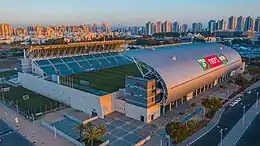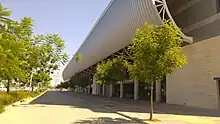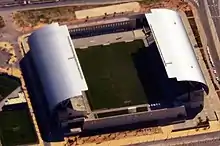 | |
| Location | |
|---|---|
| Public transit | |
| Owner | Petah Tikva Municipality |
| Operator | Petah Tikva Municipality |
| Capacity | 11,500 |
| Surface | Grass |
| Construction | |
| Broke ground | 2007 |
| Opened | 6 December 2011 |
| Construction cost | $ 60 million |
| Architect | GAB Architects |
| Tenants | |
| Hapoel Petah Tikva (2011–present) Maccabi Petah Tikva (2011–present)
| |
.jpg.webp)

.jpg.webp)


The HaMoshava Stadium (Hebrew: אִצְטַדְיוֹן הַמוֹשָׁבָה), also known as Petah Tikva Stadium, is a football stadium in Petah Tikva, Israel. It was completed in 2011, and is used mainly for football matches and is home to both Hapoel Petah Tikva and Maccabi Petah Tikva.[1]
The stadium has an all-seated capacity of 11,500 with an option for further construction of 8,500 on the south and north stands, totaling 20,000 seats.
As part of a larger sports park in the new industrial area of the city, the complex will also boast a 3,000 seat multi-purpose arena, and artificial turf training fields. The budget for the stadium was US$25 million.[1][2]
The designers of the new stadium were GAB (Goldshmidt Arditty Ben Nayim) Architects, one of Israel's leading sport architecture firms that also designed the new Netanya Stadium and Haberfeld Stadium.
The stadium was inaugurated on 6 December 2011, after almost two years of construction.[3] It was one of four venues for the 2013 UEFA European Under-21 Football Championship, staging three group matches and a semi-final.
The stadium's naming was controversial in Petah Tikva, as some local residents wished to name it Rosh HaZahav (Gold head), after local city club Hapoel Petah Tikva and Israel national football player Nahum Stelmach. As a result, Maccabi Petah Tikva supporters proposed to name the stadium after Shmuel Ben-Dror, who played in the club for more than twenty years, was Israel's first captain and scored the first ever goal for Israel.[4] After the city's refusal it was named HaMoshava after Petah Tikva's nickname, Em HaMoshavot (Mother of the Moshavot).
In 2014 HaMoshava Stadium hosted the 2014 United Supercup.[5]
International matches
| Date | Result | Competition | Attendance | ||
|---|---|---|---|---|---|
| 29 Feb 2012 | 2–3 | Friendly | 7,000 | ||
| 17 Nov 2022 | 4–2 | Friendly | 5,243 | ||
| 20 Nov 2022 | 2–3 | Friendly | 7,352 | ||
See also
References
- 1 2 "The shining stadium of Petah Tikva" (in Hebrew). . ONE. 10 May 2011. Retrieved 10 May 2011.
- ↑ "Petah Tikva Stadium". GAB Architects. Archived from the original on 8 November 2011. Retrieved 21 November 2011.
- ↑ "The stadium open date was delayed, will be inaugurated on 6 December 2011" (in Hebrew). . ONE. 21 November 2011. Retrieved 21 November 2011.
- ↑ "שמואל בן דרור, קפטן נבחרת ישראל הראשון, הלך לעולמו - וואלה! ספורט". 6 January 2009.
- ↑ "G-Drive United SuperCup 2014". RSSSF.
External links
- "Emporis building ID 270362". Emporis. Archived from the original on 9 December 2017.